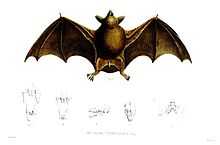Mystacinidae
| Mystacinidae Temporal range: Miocene to Recent | |
|---|---|
 | |
| New Zealand lesser short-tailed bat, Mystacina tuberculata | |
| Scientific classification | |
| Kingdom: | Animalia |
| Phylum: | Chordata |
| Class: | Mammalia |
| Order: | Chiroptera |
| Suborder: | Microchiroptera |
| Superfamily: | Noctilionoidea |
| Family: | Mystacinidae Dobson, 1875 |
| Genus: | Mystacina Gray in Dieffenbach, 1843 |
| Type species | |
| Gray, 1843 | |
| Species | |
Mystacinidae is a family of unusual bats, the New Zealand short-tailed bats. There is one living genus, Mystacina, with two extant species, one of which is believed to have become extinct in the 1960s. They are medium-sized bats, about 6 centimetres (2.4 in) in length, with grey, velvety fur.
Mystacinids are the most "un-batlike" family of bats. They spend much of the time on the ground, instead of flying, and are unique in having the ability to fold their wings into a leathery membrane when not in use. Another distinctive feature of the group is an additional projection on some of the claws, which may aid in digging or climbing. They are omnivorous, eating fruit and carrion in addition to ground-dwelling arthropods. They also eat pollen and nectar, which they are able to collect with their extensible tongues. They sometimes chew out burrows in rotting wood, but can also roost in rock crevices or the burrows of seabirds.[1]
They give birth once each summer, to a single young. They are able to hibernate during the winter.[2]
In 2010 the Department of Conservation discovered a feral cat that was responsible for killing over 100 short-tailed bats over a seven day period in a forested area on the southern slope of Mount Ruapehu.[3]
Species
- New Zealand greater short-tailed bat, Mystacina robusta (believed extinct)
- New Zealand lesser short-tailed bat, Mystacina tuberculata
The family also contains the extinct genus Icarops known from Miocene fossils found in Australia. The oldest fossils of the living genus date to the late Pleistocene of New Zealand.[4]
References
- ↑ Macdonald, D., ed. (1984). The Encyclopedia of Mammals. New York: Facts on File. p. 805. ISBN 0-87196-871-1.
- ↑ Fenton, M. Brock (2001). Bats. New York: Checkmark Books. pp. 129–130. ISBN 0-8160-4358-2.
- ↑ "Cat nabbed raiding the mothership". Department of Conservation. 22 April 2010. Retrieved 14 February 2013.
- ↑ Carter, G.G. & Riskin, D.K. (2006). "Mystacina tuberculata". Mammalian Species: Number 790: pp. 1–8. doi:10.1644/790.1.
Further reading
- Daniel. M. (1985). "New Zealand's unique burrowing bats are endangered". Bats Magazine 2 (3).
- Weinstein, B. and P. Myers (2001). "Mystacinidae". Animal Diversity Web. Accessed 6 February 2009.
- Molloy, Janice (1995). Bat (Peka peka) recovery plan (Mystacina, Chalinolobus). Wellington, N.Z.: Threatened Species Unit, Dept. of Conservation. ISBN 9780478015706.
External links
| Wikimedia Commons has media related to Mystacinidae. |
| Wikispecies has information related to: Mystacinidae |